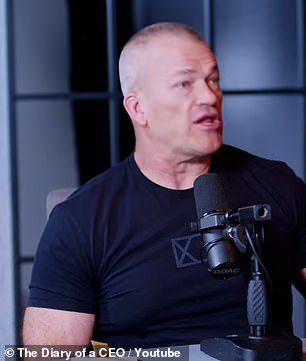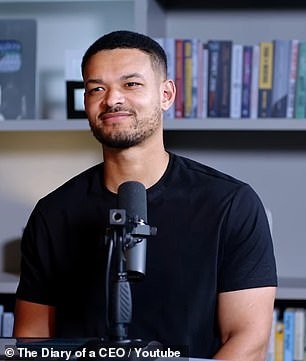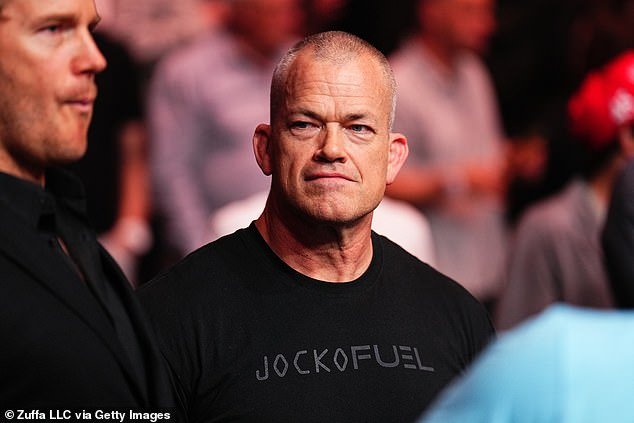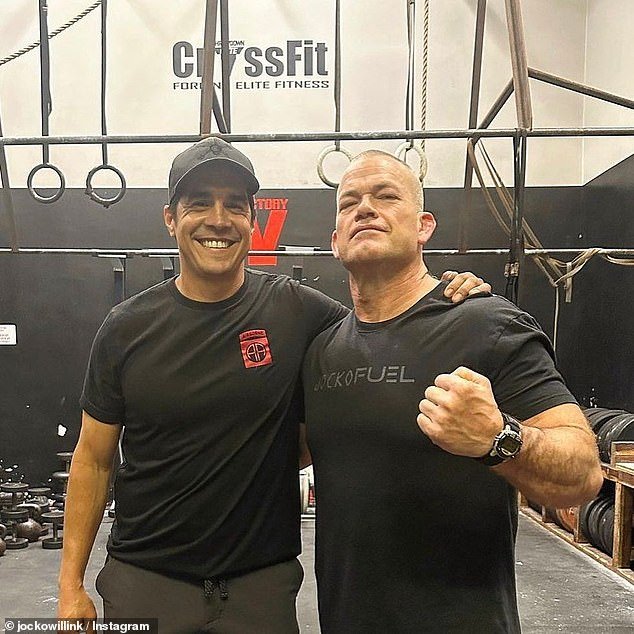Former Navy SEAL, 52, reveals the key military skills that ANYONE can use to achieve success in their lives – even if you’re at ‘rock bottom’
A former Navy Seal has revealed the tricks he learned during his training that helped him overcome fears in his everyday life, explaining how hitting rock bottom actually helped him find happiness.
Jocko Willink, 52, is a retired US Navy SEAL officer and co-founder of the leadership training organization Echelon Front.
The former SEAL, who says he has been interested in the military and combat since childhood, has now opened up about how his combat training helped him develop mental coping mechanisms that he still uses today during a podcast interview on The diary of a CEO.
After joining the military at age 18, Jocko, who is also a New York Times bestseller, signed a contract that stated he would undergo Navy SEAL training. He then worked as a SEAL for twenty years and rose to become an officer.
Jocko Willink is a retired US Navy SEAL officer and co-founder of the leadership training organization Echelon Front

Jocko, who says he has been interested in the military and combat since childhood, says his time in combat training has shaped his mental coping mechanisms today.


Speaking about the rigorous training SEALs must undergo, he revealed that as many as 80 percent of people quit in the first week
“Navy SEAL is part of the Navy, but you are the Special Operations component of the Navy, and the term SEAL is actually an acronym that stands for sea air and land,” Jocko explained to host Steven Bartlett.
Jocko said only about 20 percent of people make it through SEAL training, and for people under 20, that drops to five percent.
The former SEAL said they are more or less trying to recreate combat similar to World War II and see how future SEALs behave.
“They compressed a lot of that combat simulation,” he explains further. “It lasts about five and a half days, no sleep, a lot of physical activity, a lot of stress, a lot of pain and a lot of people quit.”
He said about 80 percent of people quit within the first week of training.
“There’s an internal drive that you either have or you don’t have, and if you have it, you’re not going to give up, and if you don’t have it, you’re going to quit,” he said simply.
He also expresses the somewhat controversial view that some people have a ‘will to live’, while others simply do not.
“There are people who had the will that they wouldn’t die,” Jocko said adamantly, referring to soldiers in battle.
‘And The people who die, they had no will to live.’
Jocko says the key to overcoming fear is building trust – in whatever way you can.


Jocko spoke to Steven Barlett, host of the Diary of CEO podcast, about how he overcomes fear and self-doubt

Jocko spent 20 years in the SEAL teams, starting as an enlisted SEAL and working his way up to a SEAL officer

The author says: ‘Although extreme ownership hurts and is painful, it is also liberating because you are now in control of your destiny and your destiny and that is a glorious thing’
He acknowledged that rejection hurts and your ego can suffer, but it’s how you deal with it and how you bounce back that matters.
“I think we can all think of people in our lives—and maybe even ourselves—who have fallen into a chronic pattern of using excuses and blame as a form of self-defense,” Steven agreed.
He continued, “Because we don’t want to [turn] that reflect back to us and have to face reality.’
Jocko says hitting rock bottom can be a great tool for rebuilding confidence in your own life because you are the only one who can restore it.
“People can actually face the fact: ‘This is all because of me and this hurts, but it’s also incredibly empowering because if these problems are because of me, I am able to solve these problems,’” he explained out.
“While extreme ownership hurts and is painful, it is also liberating because you are now in control of your destiny and your destiny and that is a glorious thing,” the author encouraged.
Jacko also suggested building more confidence by starting with smaller tasks that are easily achievable and slowly increasing the tasks and responsibility.
‘Training, studying, working, practicing [and] ultimately you will boost your self-confidence,” he insisted.
“It’s basically exposure therapy where you expose yourself a little bit,” he added.
Jocko added that despite what you may have heard, exposure therapy can actually be helpful.
“I don’t think imposter syndrome is a bad thing, I think if you feel it it’s actually a good indication that you are humble, have an open mind and are going to listen to what people have to say,” he said.

He recognized that rejection hurts and your ego can suffer, but it’s how you deal with it and how you bounce back that matters

Jocko (right) emphasized the importance of making a well-informed and thoughtful decision, and not in the heat of the moment
He also advised being honest about your skills, or if you’re not feeling well.
‘[Call people together and say] “I don’t know everything, I don’t have much experience in this particular area, but I’m humble and willing to listen and I want the team to do well,” he suggested, “no more imposter syndrome.”
Jocko also reminded people that it’s okay to feel emotions – especially sadness – but you also need to be able to control them.
“Sometimes you get hit by those waves and that’s OK,” he said.
‘Embrace those emotions, but don’t let those emotions embrace you. Don’t let those emotions rule your life,” he added.
Jocko emphasized the importance of making a well-informed and thoughtful decision, and not in the heat of the moment.
‘[Make a ] A progressive iterative decision-making process that took me from a situation I didn’t like to an opportunity that seemed more promising,” he said.
According to Jocko, the trick to getting promoted is not focusing on the end goal of getting promoted, but on accomplishing the immediate tasks in the short term.
‘Don’t think about promotion. Focus on the team, focus on the mission, focus on doing a good job, focus on supporting your teammates – if you do those things, you will get promoted,” he said.
Jocko also said it’s important not to ask for or demand accolades because it doesn’t give the impression that you’re a team player.
